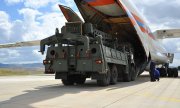Turkey gets S-400: a triumph for Erdoğan?
Despite the opposition of the US and threats of sanctions the delivery of Russian S-400 missiles to NATO member Turkey has begun. Turkey even wants to build the missile defence system jointly with Russia in the future. Commentators suspect Turkish President Erdoğan is pursuing a clear strategic goal.
Turkey is a sovereign country
Turkey has used the deal to make clear how independent it is, comments the pro-government paper Daily Sabah:
“Critics of Turkey's S-400 purchase must understand that the Turkish-Russian agreement is a matter of national sovereignty. Turkey already demonstrated its commitment to its independence by refusing to walk back the S-400 agreement. After its purchase of the Patriot system from the United States fell through in the past, Turkey established that it wants to protect its airspace. Its independence must not be tested.”
Erdoğan and Trump applying the same formulas
Le Temps believes that the weapons deal is all about image improvement:
“Recep Tayyip Erdoğan is using his purchases in Moscow to prove just one thing: he breaks rules, fights only for his country's interests, or rather for what he considers to be his country's interests, and shows everyone, including his Nato partners, how independent he is. Incidentally the same formula that US President Donald Trump is fond of applying. The Turkish economy is ailing, and it cannot be ruled out that in the end Erdoğan will have to give in to potential pressure from the US. Unless he forges ahead after being weakened in the local elections in Istanbul - at the risk of further exacerbating the unease in the Western camp.”
On track to becoming a major military power
The purchase of the Russian system is the result of Erdoğan's long-term effort to ensure that his country is independent in terms of arms technology, concludes political scientist Vasily Kashin in Kommersant:
“This policy was already intensified in the early 2000s after Erdoğan became prime minister. Turkey has doggedly pursued the goal of becoming a major power in terms of arms and an independent military power centre. It is striving to combine the privileged access to US and European technologies that comes with NATO membership with collaboration with independent countries. ... By first of all acquiring with foreign support the knowledge to repair imported technology and to produce increasingly complex military equipment, it has clearly achieved good results.”
Provocation on live television
Ilta-Sanomat reiterates that the EU must never forget what political moves Turkey is prepared to make:
“Broadcasting the delivery of the missiles on TV was by no means meant merely to entertain Turkish citizens. A direct message was to be sent first and foremost to the US that Turkey makes its own decisions on where it purchases its weapons. Europe, too, is also to take note of Turkey's missile deal. Not only as a reminder of Russia's attempts to exert influence, but also of Turkey's manoeuvring in terms of power politics. Turkey's actions must be taken into account in any future debates about it joining the EU.”
Putin's missiles have hit their target
The purchase of the S-400 system bears witness of a new geopolitical reality, the Neue Zürcher Zeitung concludes:
“The arms deals for aircraft and missiles, both those that have failed and those that have gone through, reflect the shifts in the balance of power in the Middle East. Russia is continually expanding its influence while the US, which used to practically call the shots on its own, has partially given up its leadership role. In 2003 the Americans celebrated the invasion of Baghdad. Today the cohesion of Nato is being called into question as a long-term consequence of the Iraq War. Turkey and its strong armed forces is distancing itself from the alliance. The victor by points is Russia's President Putin. Once again he has managed to undermine the unity of the West. His missiles haven't even been put into position yet, but they've already hit their target.”
Revenge for pressure from the West
Radio Kommersant FM sees the move as a political victory for Erdoğan:
“Washington is continually exerting pressure, supporting the Kurds in Syria and refusing to hand over Gülen, whom Ankara sees as the ideologist behind the 2016 coup. Europe and Germany in particular are constantly trying to force their rules on Erdoğan, expecting him to guarantee human rights, press freedom and freedom of assembly. If that's the way it is then you'll go without lucrative contracts, then we'll punish you by buying from the Russians instead, especially since they offer good systems on very favourable terms. But the S-400 doesn't constitute the whole of Turkey's air defences, just one part of it. In any case the country remains in the West's orbit - but it is forcing the latter to take it seriously.”
You can't be on both sides
Turkey will have to give up its wavering course soon, Le Monde warns:
“Donald Trump has raised his voice but the other members of the alliance still seem unsure about what stance to adopt, apart from declaring their 'concern'. They hope that the recent setbacks for Erdoğan's party in local elections will lead to his defeat in the next presidential election - in 2023. The NATO Treaty does not provide for a member state to be expelled or suspended. Turkey was already marginalised, especially because of the purges in its army after the failed coup of 2016. Now it must be completely clear-sighted in making the geostrategic decision that the S-400 affair demands. Because it can't go on being on both sides for much longer.”

